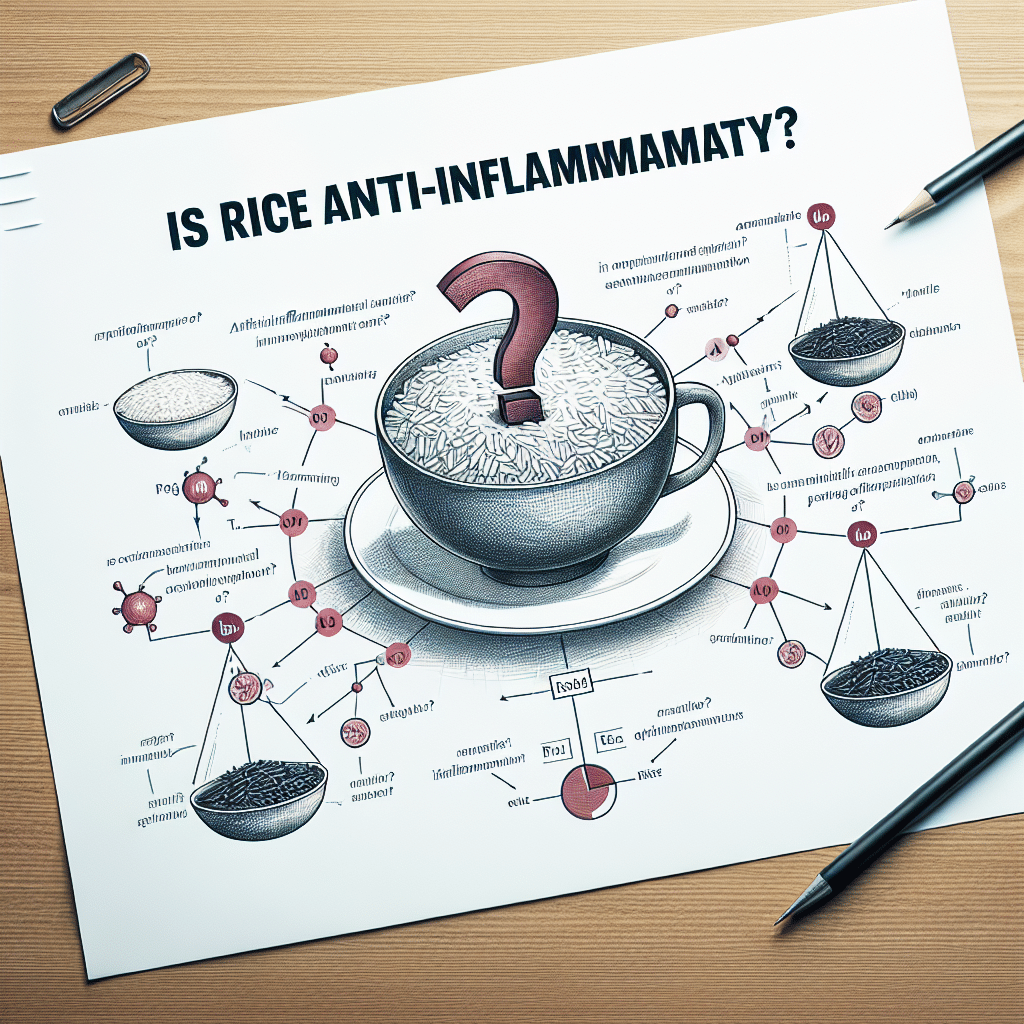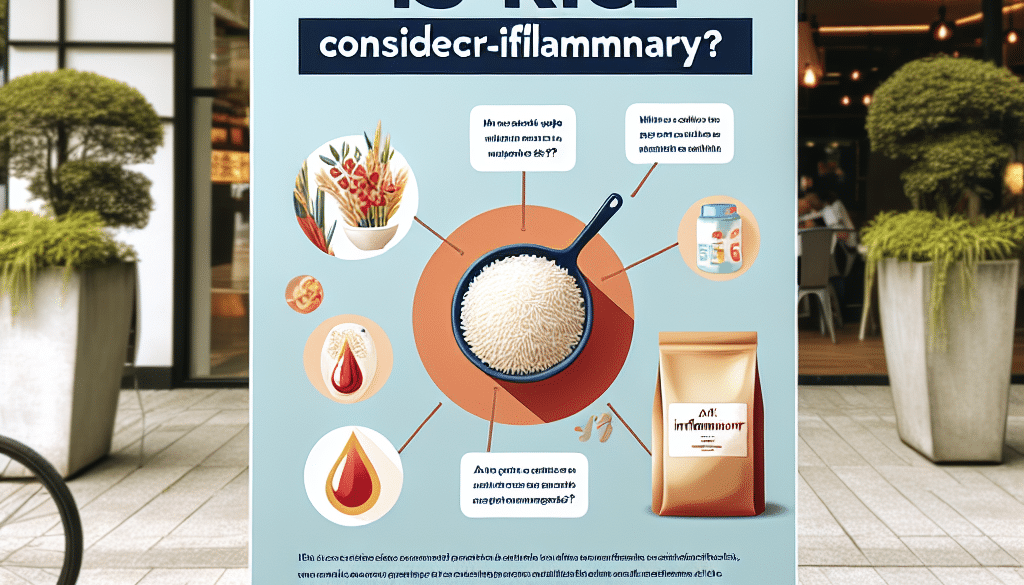Is Rice Considered Anti-Inflammatory?
-
Table of Contents
- Is Rice Considered Anti-Inflammatory? Exploring the Health Benefits
- The Nutritional Profile of Rice
- Understanding Inflammation and Diet
- Is Rice Anti-Inflammatory?
- Whole Grain Rice Varieties
- White Rice and Inflammation
- Studies and Research
- Case Studies and Statistics
- Incorporating Rice into an Anti-Inflammatory Diet
- Conclusion: Rice’s Role in an Anti-Inflammatory Diet
- Enhance Your Diet with ETprotein’s High-Quality Protein Products
Is Rice Considered Anti-Inflammatory? Exploring the Health Benefits

Inflammation is a natural response of the body to protect itself against harm. However, chronic inflammation can lead to various health issues, including heart disease, diabetes, and arthritis. Consequently, anti-inflammatory diets have gained popularity as a means to combat these conditions. One food that often comes under scrutiny for its health impact is rice. This article delves into whether rice is considered anti-inflammatory and the role it plays in a healthy diet.
The Nutritional Profile of Rice
Rice is a staple food for over half of the world’s population, particularly in Asia. It comes in several varieties, including white, brown, black, and red, each with its unique nutritional profile. Here’s a brief overview:
- White Rice: Often enriched with vitamins, it’s mostly composed of carbohydrates with minimal fiber.
- Brown Rice: A whole grain that retains its bran and germ, offering more fiber, vitamins, and minerals than white rice.
- Black Rice: Also known as forbidden rice, it’s rich in antioxidants, fiber, and protein.
- Red Rice: Contains antioxidants and nutrients similar to black rice but with a different flavor profile.
Understanding Inflammation and Diet
Inflammation is a double-edged sword. Acute inflammation is beneficial for healing injuries and fighting infections, while chronic inflammation can lead to diseases. Diet plays a crucial role in managing inflammation. Foods high in antioxidants and polyphenols, such as fruits, vegetables, nuts, and whole grains, are considered anti-inflammatory. Conversely, processed foods, refined sugars, and certain fats can exacerbate inflammation.
Is Rice Anti-Inflammatory?
The answer to whether rice is anti-inflammatory is not straightforward. It largely depends on the type of rice and its preparation. Let’s explore the different aspects:
Whole Grain Rice Varieties
Whole grain rice, such as brown, black, and red rice, contains higher amounts of fiber, antioxidants, and phytochemicals that have anti-inflammatory properties. These varieties can help reduce inflammation markers in the body.
White Rice and Inflammation
White rice, on the other hand, is often considered pro-inflammatory due to its high glycemic index, which can lead to spikes in blood sugar and insulin levels. However, when eaten in moderation and as part of a balanced diet, it may not significantly contribute to inflammation.
Studies and Research
Several studies have investigated the relationship between rice consumption and inflammation. For instance, research published in the Journal of Nutrition found that consuming whole grains, including brown rice, is associated with lower levels of inflammatory markers. Another study in the European Journal of Nutrition suggested that black rice might reduce inflammation related to heart disease.
Case Studies and Statistics
Case studies from populations that consume rice as a staple, such as in Japan and other parts of Asia, often show lower rates of inflammatory diseases. This could be attributed to the overall dietary patterns that include a variety of anti-inflammatory foods alongside rice.
Incorporating Rice into an Anti-Inflammatory Diet
To maximize the anti-inflammatory benefits of rice, consider the following tips:
- Choose whole grain varieties like brown, black, or red rice.
- Pair rice with vegetables, lean proteins, and healthy fats to balance the meal.
- Limit the intake of white rice and opt for lower glycemic index options.
- Be mindful of portion sizes to avoid excessive calorie intake.
Conclusion: Rice’s Role in an Anti-Inflammatory Diet
In conclusion, rice can be part of an anti-inflammatory diet, especially when choosing whole grain varieties and consuming them in a balanced way. While white rice is not inherently anti-inflammatory, it does not necessarily have to be excluded if eaten in moderation and as part of a diverse diet rich in anti-inflammatory foods.
Enhance Your Diet with ETprotein’s High-Quality Protein Products
If you’re looking to complement your anti-inflammatory diet with high-quality protein sources, ETprotein offers a range of organic and allergen-free protein products. Their selection includes Organic rice protein, which can be a great addition to your meals, providing not only the potential anti-inflammatory benefits of rice but also the essential amino acids your body needs.
ETprotein’s products cater to various industries and dietary preferences, ensuring that you can find the right protein solution for your needs. Whether you’re involved in sports nutrition, weight management, or simply seeking to improve your overall health, ETprotein has you covered.
About ETprotein:
ETprotein, a reputable protein and L-(+)-Ergothioneine (EGT) Chinese factory manufacturer and supplier, is renowned for producing, stocking, exporting, and delivering the highest quality organic bulk vegan proteins and L-(+)-Ergothioneine. They include Organic rice protein, clear rice protein, pea protein, clear pea protein, watermelon seed protein, pumpkin seed protein, sunflower seed protein, mung bean protein, peanut protein, and L-(+)-Ergothioneine EGT Pharmaceutical grade, L-(+)-Ergothioneine EGT food grade, L-(+)-Ergothioneine EGT cosmetic grade, L-(+)-Ergothioneine EGT reference grade and L-(+)-Ergothioneine EGT standard. Their offerings, characterized by a neutral taste, non-GMO, allergen-free attributes, with L-(+)-Ergothioneine purity over 98%, 99%, cater to a diverse range of industries. They serve nutraceutical, pharmaceutical, cosmeceutical, veterinary, as well as food and beverage finished product distributors, traders, and manufacturers across Europe, USA, Canada, Australia, Thailand, Japan, Korea, Brazil, and Chile, among others.
ETprotein specialization includes exporting and delivering tailor-made protein powder and finished nutritional supplements. Their extensive product range covers sectors like Food and Beverage, Sports Nutrition, Weight Management, Dietary Supplements, Health and Wellness Products, and Infant Formula, ensuring comprehensive solutions to meet all your protein needs.
As a trusted company by leading global food and beverage brands and Fortune 500 companies, ETprotein reinforces China’s reputation in the global arena. For more information or to sample their products, please contact them and email sales(at)ETprotein.com today.












